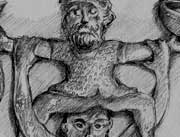Chapter 6
- (Eusa Story)
- This chapter tells the central myth of Riddley's people, in which Eusa tempts fate by splitting the Addom (atom, Adam) to obtain the secret of the 1 Big 1, leading to an apocalyptic war; has his family torn from him by degrees; and is doomed to wander the earth as he suffers the Master Chaynjis (changes). On one level, this is a straightforward narrative of forbidden knowledge and the fall of civilization, with strong echoes of the nuclear scientist's story in A Canticle for Leibowitz. But like most other things in this novel, the Eusa Story contains multiple levels of meaning. Some of these will be made explicit in Chapter 14. There are obvious echoes of older religious stories including the fall of Adam and Eve, the suffering of Christ and Job, and the lessons of hard necessity in the Bhagavad-Gita.
- Like most things in the book, Eusa's name seems to come from many sources at once: "Eustace"; "us" (his everyman role); "use" (a manipulative, mechanistic approach to life); and also (as suggested by David Cowart) "USA", the birthplace of nuclear weapons and of Hoban. (The author has since denied that any of these meanings were intentional, except for Eustace. RH)
- As noted earlier, the Eusa Story is written in a different, earlier form of English than Riddley uses. At first glance, it is more crudely phonetic. However, it is not without its own rules—e.g., "thay" as the plural form of "the." It also follows Riddley's rule of never spelling out numbers.
- The story is divided into numbered (or No.'d) verses, a useful device since Riddley and other authorities must be able to cite verses from memory. Several numbers in particular may draw our attention: 1 and 2, in an ongoing theme of duality and separation; 12, the number of points on the stag's antlers, Riddley's age, and the number of the verse in which Eusa demands knowledge from the Addom; 33, the number of the last verse, the age of both Riddley's father and Jesus at their deaths.
- (30:18) "the dansing in the stoan & thay partickler tracks"
The first of many allusions to stone and the life within it. Partickler tracks suggests a cloud chamber, an instrument of particle physics in which ionizing particles leave visible tracks in mist.
- (30:23) "He tuk 2 gray dogs with him thear nayms wer Folleree & Folleroo"
Two dogs with half-rhyming names also appear in Norse myth, as Odin's constant companions, the wolves Geri and Freki. Odin also had two ravens, Hugin and Munin, who provided him with knowledge as they scouted the world. Appropriately, Odin was not only the source of wisdom but the source of war, and was hung on a tree (for nine days) and lost an eye in order to gain power.
- (31:1) "hot & clikkin & countin thay gygers"
The clicking of a Geiger counter detecting radiation.
- (31:2) "menne cools uv stoan"
Molecules.
- (31:5) "Sum tyms bytin sum tyms bit"
Computer terms again: a bit is a binary digit (a single 1 or 0) and a byte is a series of eight bits corresponding to a single character; computers encode all information as a sequence of bits. (The pun is not Hoban's; with typical engineer humor, "byte" was coined after "bit" was already in use—spelled with a Y to make the two words more visually distinct—and "nibble" is a little-used term for half a byte.) The convenience of the binary system for digital electronics is only the most recent example of human beings' inclination to summarize everything in terms of two opposites.
- (31:16) "On the stags hed stud the Littl Shynin Man the Addom in be twean thay horns with arms owt strecht & each han holdin tu a horn"
Not only a crucifixion pose, but a specific image whose source will be revealed in Chapter 14. In an early draft of this novel, Hoban called the shining man "Lilla Jesu" EE.
- (31:20) "The Littl Man sed, I mus be wut I mus be"
An echo of the voice from the burning bush in Exodus—"I am that I am"—but in keeping with the theme of fate or the required, the Man not only is but must be.
- (31:30) "holdin him lyk twichin for water with a hayzel"
Dowsing or divining for water, traditionally done with a forked stick.
There is an obscure but evocative carving in Canterbury Cathedral that seems to convey some of the feeling of this passage. Here is a drawing of it.
- (32:) "I wan tu dark I wan tu lyt I wan tu day I wan tu nyt .... I wan tu woman I wan tu man .... I wan tu plus I wan tu minus I wan tu big I wan tu littl I want tu aul I wan tu nuthing"
Until the last, each of these is a familiar pair of the yin-yang kind. But are "all" and "nothing" a complementary pair? In each of the other pairs, you need both in order to have a whole; but "all or nothing" implies that you could just pick the "all." Is this why Eusa says, "Stop ryt thayr ... I wan that aul or nuthing No."?
- (33:4) "He run them thru the Power Ring he mayd the 1 Big 1"
Compare to the previous mention of the Power Ring in Chapter 3.
Not only is the Shining Man torn apart, but specifically his head has been disconnected from his sex—a fairly blunt allegory for the intellectualizing and sterilizing aspects of science.
Compare Jesus's 77th saying in the Gospel of Thomas (translation by Bentley Layton): "Split a piece of wood: I am there. Lift a stone, and you will find me there." PAM
